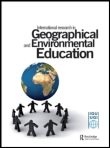
International Research in Geographical and Environmental Education
Scope & Guideline
Shaping Tomorrow's Environmental Educators Today
Introduction
Aims and Scopes
- Geographical Education Research:
The journal emphasizes empirical research on teaching and learning geography, exploring methodologies and frameworks that enhance geographical understanding among students. - Environmental Education Practices:
It investigates pedagogical approaches to environmental education, focusing on sustainability, climate change, and ecological awareness, aiming to foster responsible citizenship. - Teacher Training and Professional Development:
The journal covers studies related to teacher education, including the development of pedagogical content knowledge and the effectiveness of training programs for geography educators. - Use of Technology in Education:
It highlights the integration of geospatial technologies and digital tools in geography education, assessing their impact on student engagement and learning outcomes. - Global Perspectives and Comparisons:
The journal provides insights into geographical education across different contexts and cultures, promoting cross-national comparisons and global citizenship education. - Assessment and Evaluation in Geography:
It focuses on innovative assessment methods and tools to measure students' geographical knowledge and skills, including formative and summative evaluations.
Trending and Emerging
- Sustainability and Climate Change Education:
An increasing number of studies focus on sustainability and climate change education, reflecting a global urgency to address environmental issues and promote ecological literacy among students. - Critical Pedagogy and Social Justice:
There is a growing emphasis on critical pedagogies that promote social justice within geographical education, encouraging educators to address issues of equity and representation in their teaching. - Integration of Technology and Innovative Teaching Methods:
The use of geospatial technologies, virtual reality, and digital storytelling in education is trending, as these tools enhance student engagement and facilitate experiential learning. - Global Citizenship and International Perspectives:
Research increasingly explores global citizenship education, emphasizing the interconnectedness of local and global issues and preparing students to be active participants in a globalized world. - Interdisciplinary Approaches:
Emerging themes indicate a shift towards integrating geography with other disciplines, such as social sciences and environmental studies, fostering a more holistic understanding of complex issues. - Teacher Agency and Professional Development:
There is a notable trend in exploring the role of teacher agency in implementing innovative educational practices, as well as the need for ongoing professional development to adapt to changing educational demands.
Declining or Waning
- Traditional Geography Content:
There is a noticeable decrease in research focusing on traditional geographical content delivery, such as physical geography or purely factual knowledge, as the emphasis shifts towards skills and competencies. - Local Contextual Studies:
Research centered solely on local or national contexts without a broader international or comparative perspective seems to be decreasing, as there is a growing need for global relevance in geographical education. - Historical Approaches to Geography Education:
Themes related to the historical evolution of geography education appear to be waning, potentially overshadowed by contemporary issues like sustainability and technology integration. - Geography as a Standalone Discipline:
There is a declining focus on geography as an isolated discipline, with increasing integration of interdisciplinary approaches that combine geography with other subjects such as social studies and environmental science. - Passive Learning Methods:
Research that promotes passive learning methods, such as lectures without active engagement or inquiry-based approaches, is becoming less frequent as active and participatory pedagogies gain traction.
Similar Journals

Journal of Baltic Science Education
Empowering Educators Through Research and DiscourseThe Journal of Baltic Science Education, with ISSN 1648-3898, is a leading academic journal published by the SCI METHODICAL CENTRE - SCI EDUCOLOGICA in Lithuania. This esteemed journal, established in 2008, has gained recognition within the educational sector, boasting a notable impact factor that places it in the Q2 category for the year 2023, highlighting its significance in advancing educational research. With Scopus rankings reflecting a commendable placement at #659 out of 1543 in the Education category, the journal serves as a vital platform for disseminating knowledge and fostering discourse among researchers, professionals, and students in the field of science education across the Baltic region and beyond. The journal’s objectives include promoting innovative educational practices, sharing empirical research findings, and contributing to the development of effective science teaching methodologies, ensuring that it remains at the forefront of academic inquiry in education.

International Journal for Technology in Mathematics Education
Empowering educators with cutting-edge technological insights.International Journal for Technology in Mathematics Education (ISSN: 1744-2710, E-ISSN: 2045-2519) is a pioneering platform published by Research Information Ltd that focuses on the interplay between technology and mathematics education. Established to bridge the gap between pedagogical practices and technological advancements, this journal connects researchers, educators, and practitioners in a bid to enhance teaching methodologies and optimize learning outcomes in mathematics. Although its coverage in Scopus was discontinued after 2020, it continues to be a vital resource for those interested in the integration of technology into educational settings. With its significant emphasis on interdisciplinary approaches, the journal has garnered attention in the realms of social sciences and computer science, with Scopus rankings reflecting its niche contributions. This journal is crucial for professionals aiming to explore innovative techniques in mathematics education, making it an invaluable addition to any academic library.

Revista Educaonline
Fostering Interdisciplinary Dialogue in Digital EducationRevista Educaonline is a premier academic journal published by the Federal University of Rio de Janeiro's School of Communication, dedicated to advancing the field of online education and digital communication technologies. With the ISSN 1983-2664, this journal serves as an essential resource for researchers, educators, and practitioners exploring innovative methodologies and pedagogical frameworks in the digital landscape. Although the journal currently does not offer Open Access, it maintains a rigorous selection process to ensure the publication of high-quality research pertinent to contemporary educational practices. The editorial board is committed to promoting interdisciplinary discourse that bridges technology and education, fostering advancements that respond to the evolving needs of learners worldwide. As scholars strive to navigate the complexities of digital learning, Revista Educaonline stands out as a vital platform for disseminating impactful research, ultimately enriching the academic community's understanding of online education dynamics.
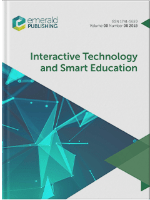
Interactive Technology and Smart Education
Innovating education: where technology meets pedagogy.Interactive Technology and Smart Education is a leading academic journal published by EMERALD GROUP PUBLISHING LTD, dedicated to exploring the dynamic intersection of technology and education. With a robust impact factor signifying its significant contributions to the field, this journal consistently ranks in the Q1 quartile in categories such as Computer Science (Miscellaneous), Education, and E-learning, reflecting its prestige and wide-ranging influence. A staple for researchers, educators, and industry professionals, the journal addresses innovative practices and developments in interactive technologies that enhance teaching and learning experiences. Operating from its base in the United Kingdom, the journal spans nearly two decades of impactful publishing, featuring high-quality research that plays a crucial role in shaping the future of education through technology. Scholars seeking to stay at the forefront of this evolving field are encouraged to contribute and engage with the journal's pioneering work.
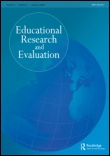
Educational Research and Evaluation
Transforming education with comprehensive evaluations.Educational Research and Evaluation is a highly regarded peer-reviewed journal dedicated to advancing the field of education through rigorous research and comprehensive evaluations. Published by Routledge Journals, Taylor & Francis Ltd, this esteemed journal features an ISSN of 1380-3611 and an E-ISSN of 1744-4187, ensuring accessibility for a global audience. With a focus on fostering innovation in educational methodologies and assessments, it has earned a position in the Q2 category of the education field, ranking #538 out of 1543 in Scopus, placing it in the 65th percentile. The journal encourages the dissemination of transformative ideas and practices from its inception in 1995 and continues to uphold its mission of knowledge expansion through the years. Its contributions underpin significant advancements in educational theories and applications, appealing to researchers, professionals, and students alike, who are eager to explore cutting-edge research findings and practical implications in the educational landscape of the United Kingdom and beyond.

International Journal of Technology in Education
Advancing Educational Practices with Cutting-Edge ResearchThe International Journal of Technology in Education, published by the International Society for Technology Education & Science (ISTES), serves as a vital platform for researchers, educators, and practitioners devoted to the intersection of technology and educational practices. With an E-ISSN of 2689-2758, this journal aims to showcase innovative research, case studies, and theoretical contributions that explore how emerging technologies can enhance teaching and learning. Although specific metrics like impact factor and HIndex are currently unavailable, the journal is committed to rigorous peer review and high academic standards, ensuring that all published work contributes meaningfully to the evolving landscape of educational technology. As an open-access journal, it strives to make research widely available, fostering collaboration and knowledge sharing among its audience. Whether you are a researcher exploring new horizons or a professional seeking practical applications of technology in education, the International Journal of Technology in Education is an indispensable resource.

Language Learning in Higher Education
Pioneering insights into contemporary language education challenges.Language Learning in Higher Education is a prominent academic journal published by DE GRUYTER MOUTON, dedicated to exploring the intricate dynamics of language acquisition and pedagogical practices within the higher education context. With a robust ISSN: 2191-611X and E-ISSN: 2191-6128, this journal provides a platform for innovative research that addresses contemporary challenges and methodologies in language education. The journal enjoys a favorable reputation in the academic community, as evidenced by its ranks in the Scopus database, where it holds a position in the 67th percentile for Language and Linguistics and is classified in the Q3 and Q2 quartiles across relevant education and linguistics categories. Since its convergence in 2017, Language Learning in Higher Education aims to enrich scholarly discourse by publishing high-quality articles that foster insights into effective language learning strategies, thus serving as an essential resource for researchers, educators, and students committed to enhancing language education. The journal's editorial team is devoted to advancing the field through rigorous peer-review processes and welcomes contributions that push the boundaries of language learning research.
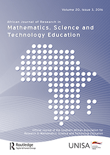
African Journal of Research in Mathematics Science and Technology Education
Shaping the Future of Mathematics and Technology LearningAfrican Journal of Research in Mathematics Science and Technology Education is a distinguished academic journal, published by Routledge Journals, Taylor & Francis Ltd, dedicated to advancing knowledge in the fields of mathematics, science, and technology education within the African context. With an ISSN of 1811-7295 and an E-ISSN of 2469-7656, this journal has been a crucial platform for scholarly discourse since its inception in 1997, steadily gaining reputation and impact among researchers, educators, and policymakers. The journal features a rigorous peer-review process, ensuring that high-quality research garners visibility across various disciplines, as evidenced by its Quartile rankings in Computer Science Applications, Education, Engineering, Mathematics, and Physics and Astronomy. With its commitment to serving the educational community and fostering innovative practices, the African Journal of Research in Mathematics Science and Technology Education plays a pivotal role in shaping the future of STEM education in Africa and beyond.
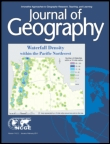
JOURNAL OF GEOGRAPHY
Driving Innovation in Earth-Surface ProcessesJOURNAL OF GEOGRAPHY is a premier academic publication dedicated to advancing knowledge in the fields of geography, planning, and education. Published by TAYLOR & FRANCIS INC in the United Kingdom, this journal boasts an impressive history since its inception in 1902 and is recognized for its commitment to scholarly excellence, as evidenced by its Q1 ranking in Earth-Surface Processes, Education, and Geography, Planning and Development categories for 2023. With Scopus rankings placing it in the top tiers of its respective fields, researchers and professionals are encouraged to engage with cutting-edge research that explores the complexities of spatial relationships and environmental processes. While the journal does not currently offer Open Access options, it serves as an essential resource for academics looking to contribute to the dialogue on pressing geographic issues. Located at 530 Walnut Street, Ste 850, Philadelphia, PA 19106, the JOURNAL OF GEOGRAPHY is devoted to fostering an understanding of the dynamic interactions shaping our world, making it a vital platform for those dedicated to geographic inquiry.
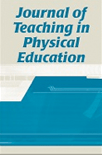
JOURNAL OF TEACHING IN PHYSICAL EDUCATION
Advancing the Future of Physical Education.JOURNAL OF TEACHING IN PHYSICAL EDUCATION, published by Human Kinetics Publishers Inc, stands as a premier academic journal committed to advancing knowledge and practice in the realms of physical education and related fields. With an impressive impact factor reflecting its relevance and influence in educational research, this journal boasts a distinguished classification as a Q1 journal in Education and Physical Therapy fields for 2023. Spanning from 1996 to 2024, it offers insightful contributions that engage educators, researchers, and students alike, addressing the evolving landscape of teaching methodologies and their implications for student health and fitness. The journal is accessible via traditional subscription models, providing a platform for innovative studies that aim to enhance teaching effectiveness and athletic performance. With a firm focus on interdisciplinary approaches, it plays a pivotal role in shaping future curricula in physical education and sports medicine.